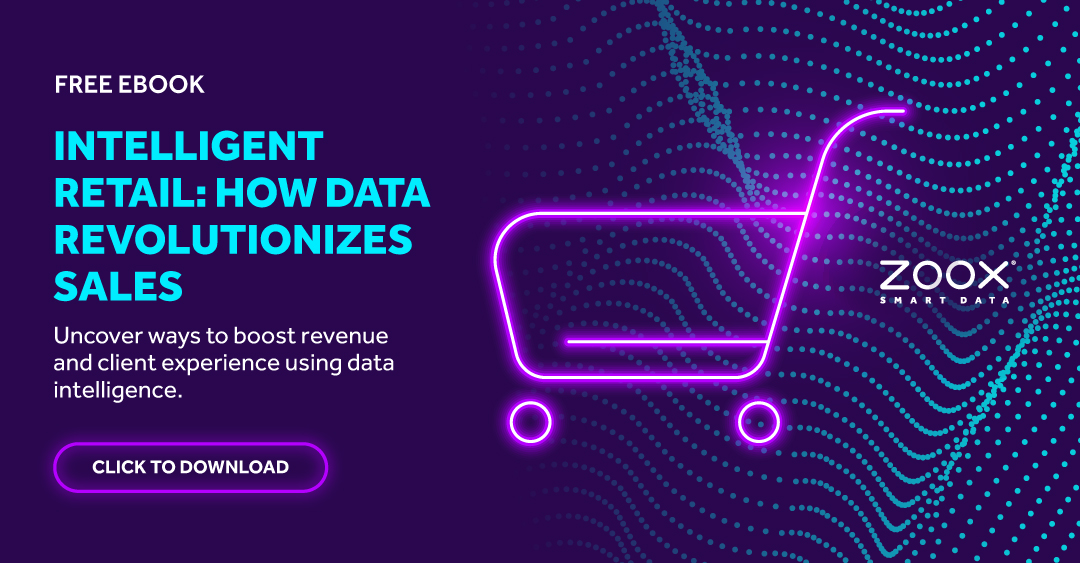Data Monetization is the Key to Increase Brand's Engagement, Sales and Power
 Zoox Smart Data - 7 de January de 2022.
Zoox Smart Data - 7 de January de 2022.
Data monetization is an increasingly popular revenue stream for companies in different industries: from financial services and retailers to media companies and publishers. The competitive edge lies in capturing the data and applying analytics in a way that boosts your business model.
Em um relatório de 2019 da eMarketer focado em negócios de varejo, é possível observar características semelhantes entre negócios que investiram em monetização de dados:
Companies are turning their first-party customer data - collected from campaigns, forms, social networks, surveys, and other techniques - into 'data products'. Thus, these companies have initiated a lucrative move to gain a competitive advantage in the marketplace.
In a 2019, a report by eMarketer focused on retail businesses, one can see similar characteristics among businesses that have invested in data monetization:
- there is good quantity and quality of first-time customer data
- they drive more volume to their online/digital environments
- there is a marketing trail aligned with technology innovations to get everyone on the same page
- What is data monetization?
- Benefits of data monetization
- How to increase sales with data
- How data can improve your brand engagement
What is data monetization?
Simply put, data monetization is using your company's data - which includes customer data - to generate new revenue streams. Your company's data can be monetized in, for example, 3 ways:
- The 1st is to sell the data directly or through, for example, a Data Broker - which aggregates information from numerous sources and treats this data, sanitizes, analyzes and licenses it to other companies.
- The 2nd way is through information exchange. In other words, an organization can exchange its data for others or even for goods, services. Data can also serve as assets in negotiations with partners, for example.
- Finally, data monetization can be done indirectly, that is, making use of the information to improve business results or create new products from the insights generated.
And it is this third form of use that we will focus on here, since it is this that produces results and short, medium, and long-term gains for your company.
In this process, it is essential to comply with the data legislation in force in your country, whether it is the LGPD (Brazil’s Lei Geral de Proteção de Dados), GRPD (Europe’s General Data Protection Regulations), CCPA (California Consumer Privacy Act), POPI (South Africa’s Protection of personal information) or another. This care is crucial to avoid fines and to treat the consumer with respect.
Benefits of data monetization
Quality data monetization ensures that you get the most value from your data, maximizing profits, reducing costs, and optimizing opportunities for your organization, customers, and partners. Here are some of the many advantages of working with data monetization:
- Optimizes data usage
- Extracts more, and better insights for your organization, customers, and partners
- Simplifies decision making and planning
- Democratizes access to data across your enterprise, improving collaboration among employees
- Increases operational productivity and efficiency
- Reduces operational costs
- Improves customer understanding, thereby enhancing the customer experience and strengthening brand loyalty
- Accelerates awareness of product improvement needs
- Grow marketing results from targeted campaigns
- Maximizes the value of your products and services, i.e. multiplies revenue streams
- Helps you identify new growth opportunities in the marketplace
- Faster identification and mitigation of risks, churns and fraud
- When done responsibly, improves your company's compliance with applicable privacy and data protection laws
- Strengthens your company's competitive advantage
How to increase sales with data
 Increasing sales is always a goal for each and every company. It is a mantra in any book, eBook, or business manual.
Increasing sales is always a goal for each and every company. It is a mantra in any book, eBook, or business manual.
That's because increasing sales increases revenue, which helps cover future expenses and investments, as well as allowing you to attract more talent to your company and expand market relevance.
Research shows that investments in big data are expected to increase from about $140 billion in 2020 to more than $240 billion in 2025. Companies that adopt big data practices can increase their retail sales by up to 4%.
To increase your sales with data, your company can:
Collect and analyze traffic analytics
This technique gives your employees access to detailed information about their target audience or specific audiences. The more information you have about your customers, the more you can target them. The data can be demographic and/or behavioral - age, gender, income, geographic location, interests, and preferences.
Research by WebFX has shown that segmentation can account for up to about 58% of a company's entire revenue.
Collect data to showcase and stand out
Don't just use data internally, as back-office sources. They can be very valuable in convincing a customer to finalize a purchase.
So showcase data from your services, products, from reviews, reach, results, anything that can somehow distinguish your company from the competition and increase sales.
A 2021 survey by Boast showed that:
- More than 90% of customers read reviews before buying a product or service
- More than 70% believe that positive reviews increase their trust in a company
- 88% say reviews affect their purchasing decisions
How data can improve your brand engagement
Your data-driven sales and marketing strategy has the power to greatly improve your brand's engagement with customers and prospects.
One smart alternative is to use artificial intelligence for this. Software called Natural Language Processing (NLP) is able to analyze your customers' behavior in the digital environment and uses the information to improve the way your employees respond to customers, the brand's tone of voice, and even the language of your chat bot.
This can greatly help resolve conflicts before they become brand and communication crises, for example. Research by Scott Gould has shown that missing or incorrect customer engagement accounts for 25% of lost sales each year, and an engaged customer can spend up to 300% more each year.
To collect this information, you can invest in software such as Smart Wifi with surveys and NPS, Customer Data Platforms with unique customer IDs and segmentation of communication through demographic and behavioral data, and many others.
 We couldn't let you go without a gift.
We couldn't let you go without a gift.
This is the reason why we are granting you our new eBook with identified challenges, main solutions and tech trends for the retail sector. Click on the image above to download it for free.
Get to know Zoox
If your company is also looking for better visibility into the consumer journey, get to know Zoox Smart Data's solutions. We are a technology and innovation company focused on the application of integrated solutions for user experience, business intelligence and monetization of hypersegmented media.
We are one of Brazil's leading technology companies, with Big Data projects in 23 countries, serving clients from different industries such as transportation, hospitality, insurance, healthcare, airports and bus stations, and, of course, retail.
None of this, however, would make sense if we didn't do everything to protect your data and privacy. And that's why we have an area 100% dedicated to Data Privacy and Compliance, responsible for managing our Privacy Governance Program, which incorporates all the principles of the Privacy by Design framework, from product conception to delivery and execution, by default.
Contact us and ask for a demonstration.






Comments